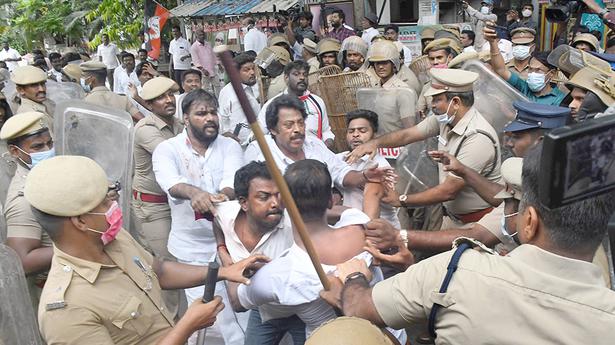The fortunes of the AIADMK will once again be irrevocably changed with the divergent paths that two of its most recent leaders have taken. While the impact of this split on the political firmament of Tamil Nadu could be gauged to some extent with the 2024 Lok Sabha election, the party’s implosion does not bode well for it, political observers point out
The fortunes of the AIADMK will once again be irrevocably changed with the divergent paths that two of its most recent leaders have taken. While the impact of this split on the political firmament of Tamil Nadu could be gauged to some extent with the 2024 Lok Sabha election, the party’s implosion does not bode well for it, political observers point out
The picture of AIADMK interim general secretary Edappadi K. Palaniswami sitting alone at the meeting of the AIADMK’s legislature party on July 17 tells it all. The message is loud and clear: Mr. Palaniswami, who was relatively unknown till he assumed the mantle in February 2017, presents himself as the one who is on a par with former Chief Minister Jayalalithaa, who was till a few weeks ago the party’s “eternal general secretary”.
Mr. Palaniswami’s thinking was evident when he became the Chief Minister nearly five-and-a-half years ago. Unlike his immediate predecessor O. Panneerselvam, who did not occupy the Chief Minister’s chamber at Fort St. George in deference to Jayalalithaa when he stepped in for her, Mr. Palaniswami did not have any such inhibition. From day one, he used the room meant for the Chief Minister till he demitted office in May 2021.

‘Not charismatic’
But what his critics reinforce and even admirers acknowledge is that the newly appointed interim general secretary does not have the charisma that Jayalalithaa had. Perhaps, this is why Mr. Palaniswami constantly harps on the point that in the AIADMK, a worker, even from the modest background, can rise to the top. The 2021 Assembly election demonstrated that the absolute gap between the party and its principal adversary, DMK, was 4.41 percentage points and, in terms of the vote share in the contested seats, the difference was 5.97 percentage points. In terms of the votes polled, the AIADMK netted about 20.39 lakh votes fewer than the DMK. Having suffered a dent in its vote base following the ouster of Jayalalithaa’s former aide and interim general secretary V.K. Sasikala and former Member of Parliament T.T.V. Dhinakaran from the party in 2017, the organisation is likely to suffer a further loss with the expulsion of Mr. Panneerselvam and his associates.
“The party’s future depends upon his [Mr. Palaniswami’s] leadership and ability to carry forward the organisation,” says G. Palanithurai, a veteran academic in political science and public administration. The interim general secretary had shown his managerial skills when he, as the Chief Minister, had run the administration “without invoking much resentment among the public”. A chronicler of the AIADMK commends Mr. Palaniswami for having taken a non-compromising stand against accommodating Ms. Sasikala or Mr. Dhinakaran at the time of the 2021 Assembly election, despite the BJP’s advice to do so.
But a new factor in the politics of Tamil Nadu that can pose a bigger challenge to the AIADMK has been the entry of former police officer K. Annamalai as the BJP’s State president in early July 2021. And it cannot be glossed over. He has been able to create a perception that neither he nor his party is a pushover.
In fact, R. B. Udhayakumar, the newly elected deputy floor leader of the AIADMK legislature party and State secretary of the Amma Peravai, is short of admitting the impact of the “Annamalai factor”. He says there had been “concerns” among sections of the party that it had not been functioning as an effective Opposition party. “This is why we had to go in for a reform measure. It is not something that we have done willingly. Yes, it’s a bitter experience. But there is no other way,” he says, underscoring the importance of restoring single leadership and making Mr. Palaniswami the interim general secretary. He concedes that the party has not been oblivious to the possibility of “incurring some losses”.
‘Permanent deposit’
At the same time, the former Revenue Minister , who represents Thirumangalam in the Assembly, describes the vote bank “created by MGR [AIADMK founder M.G. Ramachandran] and nurtured by Jayalalithaa” as a “permanent fixed deposit”. Even in the 2021 election, in the calculation of Mr. Udhayakumar, the difference between the AIADMK-led front and the winner was a “mere margin” of 1.92 lakh votes in 43 constituencies. “Had we won there, we would have been in power now,” he contends, adding that the vote bank should be “augmented” at times.
One more factor that can cripple the working of the AIADMK brass is the kind of legal battles that Mr. Palaniswami and many of his colleagues may have to face in the coming months in the light of corruption charges against them. when they were in power. It is not that the interim general secretary’s future alone is riddled with uncertainty. The case of his erstwhile colleague, Mr. Panneerselvam, may vary from that of the other in details but, qualitatively, the deposed coordinator is also facing difficult days. In the political landscape of Tamil Nadu, the role of a third force has been very limited historically. At best, it can be a spoiler, as the Desiya Murpokku Dravida Kazhagam was in the 2009 Lok Sabha election and the Amma Makkal Munnetra Kazhagam (AMMK) 10 years later. On both the occasions, the AIADMK suffered.
It remains to be seen whether Mr. Panneerselvam will remain an independent player or join hands with Ms. Sasikala and Mr. Dhinakaran, both of whom have been sidelined by the AIADMK. “As of now, there has not been any formal discussion about aligning ourselves with Ms. Sasikala. Despite talking about the possibility of taking her back into the party prior to the June-July inner-party events, Mr. Panneerselvam has not made any such observation in the last couple of weeks,” says J.C.D. Prabhakar, a deputy coordinator of the Panneerselvam camp and two-time legislator. Nearly five months ago, AIADMK functionaries in Theni district , belonging to both urban and rural units, unanimously adopted a resolution that the party consider readmitting both Mr. Dhinakaran and Ms. Sasikala without any pre-condition. The venue of the three-hour meeting was the farm house of Mr. Panneerselvam, who was also present.
‘Doubts cleared’
The party’s machinery, by and large, appears to have rallied behind Mr. Palaniswami, barring two more legislators — R. Vaithilingam and P.H. Manoj Pandian — and a handful of district secretaries. “When MGR came out of the DMK, not many MLAs followed suit. But workers were with him,” Mr. Prabhakar recalls. Several persons had expressed “doubts” over Mr. Panneerselvam being able to find persons for appointment as district secretaries.
“But so far, we have filled the post of district secretaries in 60 places out of a total of 75,” he points out, adding that Mr. Panneerselvam’s approach has been “all-inclusive and accommodative” of diverse and under-represented sections of society.
Ms. Sasikala, who has resumed her political work by embarking on ‘Puratchi payanam’ (a revolutionary journey) to different parts of the State, appears to be in a conciliatory mood towards Mr. Panneerselvam, who revolted against her in early February 2017 to launch ‘dharmayudham,’ a campaign against the domination of her family in the AIADMK. The talk of rapprochement between the two leaders was there even before Ms. Sasikala’s return to Chennai in February 2021 on completion of her imprisonment in Bengaluru. This was reinforced in September 2021 when Ms. Sasikala visited him the day his wife died at a Chennai hospital.
About a week ago, she issued a statement, terming the expulsion of Mr. Panneerselvam’s son and Theni MP P. Ravindhranath “unfair”. In early March, his younger brother O. Raja, also the chief of the Theni District Cooperative Milk Producers’ Union (Aavin), met her in Tiruchendur. For this, he was expelled from the party. A few days ago, Mr. Panneerselvam issued a statement, taking back all those who were expelled from the party before July 11 and who had expressed willingness to return to the party. Would this cover Mr. Raja, too? “Of course,” Mr. Prabhakar shoots back, adding that a “blanket approval” has been given for those who want to return.
However, there may be one area of divergence between Mr. Panneerselvam and Ms. Sasikala. While he has been projecting himself as a defender of ‘dual leadership’, she favours ‘single leadership’. Mr. Dhinakaran, on his part, seems to be chalking out his path independently and he remains firm in his goal of “retrieving” the AIADMK from the hold of “detractors”, a term that is now applicable to Mr. Palaniswami. He has reactivated his party network. After the setbacks in the Lok Sabha and Assembly elections, he has not been in the limelight but he is still counted in political circles as one of those who can make a difference to the fortunes of the party.
It appears the AIADMK and the BJP will sail together in the 2024 Lok Sabha election, going by the camaraderie that exists between leaders of the two parties. Mr. Panneerselvam, too, is keen on continuing the partnership with the national party. In certain quarters, the expectation is that the BJP will make every effort to bring all the constituents of the “AIADMK family”, including Ms. Sasikala and Mr. Dhinakaran, under one umbrella and fight the election; as, after all, it made one such attempt, albeit unsuccessfully, at the time of the Assembly election. Also, Prime Minister Narendra Modi’s “advice” to Mr. Panneerselvam was said to have facilitated the coming-together of the groups of Mr. Palaniswami and Mr. Panneerselvam in August 2017.
Regardless of any such move by the BJP in the near future, what should be clear to both Mr. Panneerselvam and Mr. Palaniswami is that their political future as well as that of the AIADMK hinges on the success in the electoral battle that will take place in two years.





